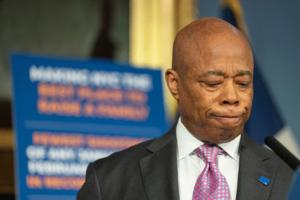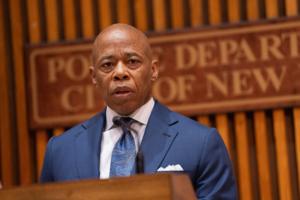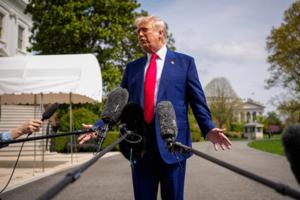Current News
/ArcaMax

Colorado's gray wolves roamed closer to metro Denver, farther south in mountains
DENVER — Colorado’s collared gray wolves continued to travel widely last month — even roaming in watersheds that reach into the western portions of metro Denver, according to a new map released this week by state wildlife officials.
Reintroduced wolves were tracked in watersheds from the Utah border in Mesa County, in the west, to the ...Read more

Trump says he would veto cuts to Medicaid, Social Security
WASHINGTON — President Donald Trump said he would not sign legislation that calls for cuts to Social Security or federal health coverage for older and low-income Americans.
“If it cuts it, I would not approve,” the president said in an interview with TIME magazine published Friday, where he was repeatedly asked about cuts to Medicare, ...Read more

Epstein accuser Virginia Giuffre dies by suicide, family says
Virginia Giuffre, who accused financier Jeffrey Epstein and Britain’s Prince Andrew of sexual abuse as a teenager, has died by suicide, her family said. She was 41.
Giuffre died at her farm in Western Australia on Friday night, her family said in a statement.
“She lost her life to suicide, after being a lifelong victim of sexual abuse and ...Read more

Rubio prods Congo, Rwanda to make peace as duo agree to deadline
Rwanda and Democratic Republic of Congo committed to drafting a peace agreement aimed at ending decades of conflict between the two countries in a ceremony at the U.S State Department Friday.
Congo’s Foreign Minister Therese Kayikwamba Wagner and her Rwandan counterpart, Olivier Nduhungirehe, signed the “declaration of principles” with U....Read more

US eyes post-war business with Russia in energy, metals
The Trump administration is looking at cooperation in the Russian energy sector as a key element of economic enticements to win over the Kremlin as it pushes for a deal to end the war in Ukraine, according to people familiar with the planning.
Joint projects in the Arctic, as well as oil and gas and rare-earth minerals, are among the options ...Read more

Trump orders 'ideology' removed from Smithsonian. What about North Carolina's sit-ins exhibit?
WASHINGTON — President Donald Trump issued an executive order last month putting Vice President JD Vance and an attorney in charge of finding and “removing improper ideology” from monuments, museums and the National Zoo overseen by the Department of Interior.
This week, the news outlet BlackPressUSA published a report that an exhibit from...Read more

Oakland police to cut off public from live radio feeds, hiding communications from airwaves
OAKLAND, Calif. — For decades, the public has had the ability to tune into radio channels where Oakland police and other Bay Area law enforcement agencies discuss emergency calls and coordinate responses.
The police scanner feeds are a prime source of transparency around cop activity, but in the coming months the Oakland Police Department ...Read more

US agents cleared for warrantless arrest of alleged gang members
Federal law enforcement agents can arrest Venezuelan nationals in the U.S. suspected of belonging to the Tren de Aragua gang without a judicial or administrative warrants, according to a directive from Attorney General Pam Bondi.
The memo, dated March 14 and obtained through a public records request by the transparency group Property of the ...Read more

First Harvard, now UC Berkeley: Trump administration to probe foreign funds
The Trump administration accused the University of California, Berkeley of failing to disclose millions of dollars in foreign funding on Friday, touting muscular new enforcement of an obscure federal rule amid ongoing efforts to bridle America’s top research institutions.
The University of California flagship is the second top school to come ...Read more

Audit finds 55-year lapse in DNR's reporting of land inventory
The Department of Natural Resources does a good job selecting land to acquire, but the process takes too long and the agency has gone 55 years without the legislatively required reporting of an inventory of DNR-managed land, according to the Office of the Legislative Auditor.
The agency’s failure to publicly report its land holdings, as ...Read more

Langley air show to proceed as investigation into famed pilot's death begins
NORFOLK, Va. — The Joint Base Langley-Eustis “Air Power Over Hampton Roads” air show will continue this weekend in Virginia despite a plane crash on Thursday that killed well-known aerobatic pilot Rob Holland.
“We’ve decided to proceed with the Air Power Over Hampton Roads air show this weekend as scheduled,” said Col. Matthew ...Read more

Trump says Russia and Ukraine are 'very close to a deal'
President Donald Trump said Russia and Ukraine were “very close” to an accord after his special envoy met with Vladimir Putin in Moscow and he called for high-level talks between the two countries to help bring an end to the war.
“A good day in talks and meetings with Russia and Ukraine. They are very close to a deal, and the two sides ...Read more

NYC Mayor Adams took tickets to Knicks game, Billy Joel concert from Madison Square Garden, documents show
NEW YORK — New York City Mayor Eric Adams accepted between $1,000 and $6,000 worth of gifts from the Madison Square Garden business empire last year as the entertainment giant continues to hold significant financial interests before his administration, according to new records.
Adams’ latest financial disclosure, a copy of which was ...Read more
News briefs
Boeing, NASA pause experimental, sustainable plane project
Boeing and NASA will pause work on a new, experimental aircraft design meant to deliver more sustainable options for the future of aviation.
The aircraft project — called the X-66A Sustainable Flight Demonstrator — featured long, thin wings that would increase fuel efficiency and, ...Read more

Organizations wrestle with Justice Department grant cuts
WASHINGTON — Nonprofits across the nation are grappling with the Trump administration’s decision to terminate a swath of Justice Department grants this week, as critics say the ripple effects are sure to harm public safety.
Organizations and their supporters have slammed the move and report that grant funding was terminated immediately, a ...Read more

Judge in NYC Mayor Adams' now dismissed case order documents released
NEW YORK — The judge in New York City Mayor Eric Adams’ now-dismissed corruption case on Friday ordered a trove of documents be released.
The documents, which are slated to be released Friday, May 2, could provide a window into the case, which never made it to trial. They include some search warrant materials, affidavits describing evidence...Read more

FBI arrests Wisconsin judge in immigration obstruction probe
A state judge in Wisconsin was charged Friday by the FBI with obstructing federal officials who tried to detain an undocumented immigrant, escalating the Trump administration’s conflict with the judiciary over its hard-line immigration strategy.
Milwaukee County Circuit Judge Hannah Dugan was accused of obstructing a proceeding and concealing...Read more

Federal officials arrest a Milwaukee judge accused of obstructing an immigration arrest
The Trump administration significantly ramped up its clash over immigration with officials at the state and local level Friday after FBI agents arrested a county judge in Milwaukee, accusing her of obstructing an immigration arrest.
“Just NOW, the FBI arrested Judge Hannah Dugan out of Milwaukee, Wisconsin on charges of obstruction — after ...Read more

States sue to block Trump freezing school funding over DEI
A group of 19 states sued to block the Trump administration from freezing federal funds for states that refuse to eliminate diversity, equity and inclusion programs in K-12 public schools, intensifying a legal battle over billions of dollars in assistance.
The lawsuit filed Friday in Boston federal court follows a warning this month from the U....Read more

Trump doubtful on another tariff pause, wants China concessions
WASHINGTON — President Donald Trump suggested another delay to his higher so-called “reciprocal” tariffs was unlikely, raising pressure on nations to negotiate trade deals with his administration.
Asked about the possibility of granting another 90-day pause, Trump cast that scenario as “unlikely,” while speaking to reporters aboard ...Read more
Popular Stories
- What presidents had the greatest approval at 100-day mark? Poll reveals how Trump compares
- Jurors find man guilty of murder in Colorado rock-throwing spree that killed 20-year-old woman in car
- Federal officials arrest a Milwaukee judge accused of obstructing an immigration arrest
- Heightened wildfire risk in region as 15,300-acre Jones Road Fire still burns in NJ, and Pa. battles a new blaze
- Is a college degree worth it? Huge generational divide found in new poll





